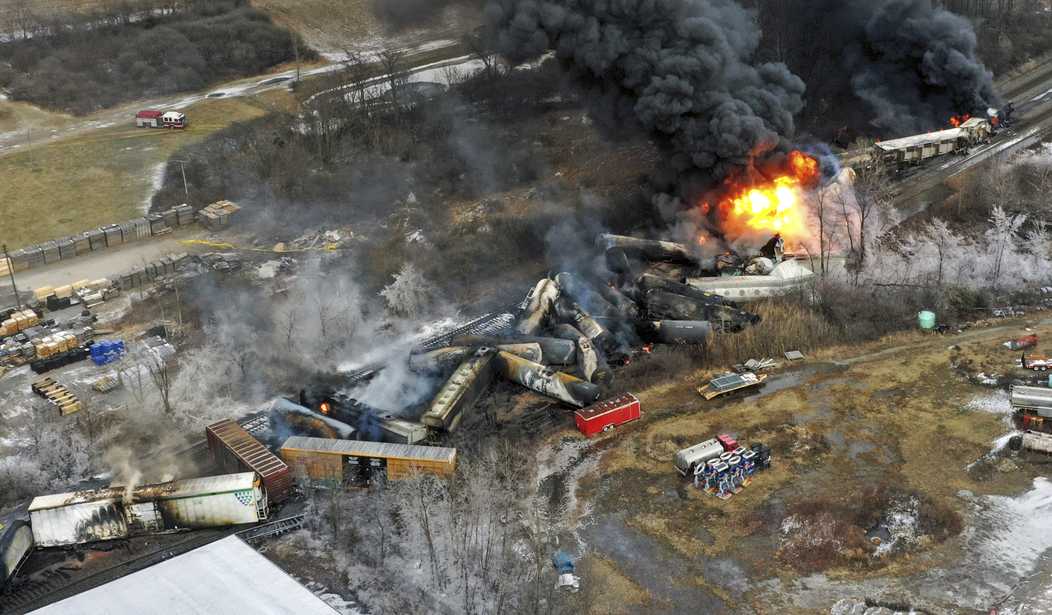Ohio's U.S. Senators Sherrod Brown and JD Vance — one a Democrat and one a Republican — have found another moment for bipartisan agreement: to demand officials begin health screenings for the residents of East Palestine in the wake of a February 3rd train derailment that released toxic chemicals in the community.
Ohio's senators asked that the Environmental Protection Agency (EPA) and Centers for Disease Control and Prevention (CDC) begin the voluntary screenings "as soon as possible" so that officials are able to "establish a medical baseline from which to track any future negative health outcomes" that may result from exposure to the chemicals released by the Norfolk Southern derailment.
In a joint letter to EPA Administrator Michael Regan and CDC Director Rochelle Walensky, the senators explain that "multiple constituents" have tried to get such baseline testing done through their usual primary care doctors in the community, but found "their local doctors lack the capabilities."
If such testing can't take place to establish a baseline, doctors have warned that potential longer-term negative health outcomes in residents of East Palestine will be more difficult to identify.
Both Brown and Vance have spent time in East Palestine meeting with their constituents, and they recounted what they saw and heard:
Our visits to East Palestine left us struck by the anxiety and lack of trust experienced by this community. From the fumes lingering in their homes, to the dead fish in their streams, and the chemical leach from subsurface soils into surface water, the reasons for this unease are obvious. We have witnessed the way that chemicals seep out of underwater soil; it is understandable why residents are worried. The only way to assuage those concerns is to take them seriously and respond in an open and transparent manner.
Recommended
Brown and Vance acknowledge in their letter that most involved state and federal agencies "have been more focused—by design—on emergency removal action and associated risks related to acute exposure in the immediate aftermath of the derailment" but say they "want to ensure that efforts moving forward also anticipate and address our constituents' concerns over potential long-term impacts" from exposure to contaminants that did or will occur.
Ohio's U.S. senators note that they "solicited a professional opinion" from Professor Kyle Walsh of Duke University's School of Medicine and Professor Glenn Talaska of the University of Cincinnati's College of Medicine. "Their professional opinion advises the immediate initiation of a health survey of residents in the affected region," Brown and Vance report in their letter:
As Professors Walsh and Talaska note, “In the coming months and years, additional epidemiologic assessments will be necessary to identify potential longer-term negative health outcomes in exposed residents.” However, “[r]igorously and empirically determining the longterm health consequences will be complicated by a lack of adequate comparator populations.”
Professors Walsh and Talaska argue that “[c]onducting pre/post comparisons of subclinical biomarkers will be instrumental in assessing emerging immunologic and genetic consequences of exposure. … Because the impacts of exposure will continue to accrue, obtaining these data and samples requires immediate action.”
Professors Walsh and Talaska recommend the voluntary collection of health indicators from a broad spectrum of residents of the East Palestine region to allow these residents to establish a medical baseline from which to track any future negative health outcomes resulting from their exposure. This effort should begin as soon as possible, while the opportunity to collect a valid baseline remains.
Emphasizing that those who call East Palestine home "deserve to know if their health has been compromised by this disaster now and for years to come," Brown and Vance call on officials "across the federal government to allocate the resources and expertise needed to begin the surveys and assessment" of the current condition of residents.
Senators Brown and Vance previously teamed up in February to send a letter to the U.S. EPA and its state counterpart in Ohio asking for their plans "to monitor East Palestine and surrounding areas for dioxins," a highly toxic pollutant that comes from burning vinyl chloride — which occurred following the derailment — and is known to accumulate in animals and humans and cause cancer, reproductive issues, and damage to the immune system.

























Join the conversation as a VIP Member